#a fist of permutations in lightning and wildflowers
Explore tagged Tumblr posts
Text

- Alyssa Wong, A Fist of Permutations in Lightning and Wildflowers
3 notes
·
View notes
Text
short fiction i've been enjoying lately
“If at First You Don't Succeed, Try, Try Again,” by Zen Cho
“A Fist of Permutations in Lightning and Wildflowers,” by Alyssa Wong
“Playing Nice with God’s Bowling Ball,” by N.K. Jemisin
“When the Letter Comes ,” by Sara Fox
“Morrigan in the Sunglare,” by Seth Dickinson
“Of Roses and Kings,” by Melissa Marr
“Beyond the Dragon's Gate,” by Yoon Ha Lee
“Small Changes Over Long Periods of Time,” by K.M. Szpara
#my favorites are the 8th bc trans vampires<3 and morigan in the sunglare bc seth writing pain is my favorite genre okay so i love everythin#short fiction#book recs#sff recs
92 notes
·
View notes
Text
underrated SFF books (YA and Adult)
So uhm, since I keep seeing the same books on my dash all the time (and I like them too, just...there’s more! to read!) here’s a list of less popular SFF books, divided into YA and Adult. I’ve tried to mention when there is lgbt rep and the trigger warnings. Also, books written by poc will be in bold. Please point out any typo or mistake or if I’ve forgotten specific rep/tw mentions.
All of these are books that I’ve read and enjoyed (by enjoyed I mean anything from 3 stars and above), but if anyone wants to add titles please feel free to do so!!
YA:
The Star-Touched Queen by Roshani Chokshi: beautifully written, fairytale-like story rich in mythology (inspired by several Hindu myths. There’s a full list on goodreads indicated by the author herself). Roshani’s prose is gorgeous.
A Crown of Wishes by Roshani Chokshi: it’s a companion novel to The Star-Touched Queen, but both can be read as a standalone. I liked this one more than its companion and I particularly loved how the romance was written (slow burn, but specifically, the author really highlights the mutual respect between the characters, we love to see it).
The Young Elites by Marie Lu: fantasy trilogy set in a world inspired by Renaissance Italy, in which children who survived a mysterious and deadly illness ended up with strange and dangerous powers. Secret societies and a female villain!
The Kingdom of Back by Marie Lu: historical fantasy following Mozart’s sister, Nannerl, a girl as talented as her brother, but afraid of being forgotten because of the lack of opportunities she has to be seen and heard. Nuanced sibling relationship, no romance.
The Midnight Lie by Marie Rutkoski: fantasy f/f romance! Both a coming of age story set in a society with a rigid class system and a slow burn f/f romance with a lot of banter. TW: abuse.
The Weight of Feathers by Anna-Marie McLemore: magical realism. The book follows two families of traveling performers that have been locked in a feud for over a generation. This was the author’s debut and I remember getting an arc of it and being impressed by both the prose and how the forbidden love trope was handled.
When the Moon was Ours by Anna-Marie McLemore: another magical realism novel. One of the main characters is a trans boy and the book focuses on issues of racism and gender. One of my favorite YA!
Strange Grace by Tessa Gratton: fantasy romance set in a village that periodically sacrifices a young man in order to keep a deal with the devil that ensures their prosperity. Also, polyamorous and non-binary rep.
The Rise of Kyoshi by F.C. Yee: first book in a duology following avatar Kyoshi’s life. It explores the political and cultural aspect of the Earth Kingdom and Kyoshi’s past. Bisexual rep.
Descendant of the Crane by Joan He: sort of a murder mystery fantasy, as the main character finds herself suddenly thrust into power once her father has been murdered. The story has a slow build up to a last part full of twists and machinations and it features lots of court intrigue. Warning: the ending is quite open and afaik there isn’t a sequel planned as of now.
The Bone Houses by Emily Lloyd-Jones: a quite unique take on zombies influenced by Welsh mythology (it’s super cool). The novel follows Ryn and their siblings, as they try to get by after their parents’ death by working as gravediggers. Only well, the dead don’t always stay dead. The characters read a bit younger than they are imo. There is chronic pain rep.
The Magnolia Sword by Sherry Thomas: retelling of the original ballad of Mulan. The book follows Mulan, who’s trained her whole life to win a duel for a priceless heirloom, as she joins the army. There’s a lot of political and historical details, which I really appreciated. Do not go into it expecting a fun adventure though. The descriptions of war aren’t extremely graphic, but be aware of the fact that most of the book is set during a conflict.
The Candle and The Flame by Nafiza Azad: standalone fantasy set in a city on the Silk Road! It’s a quite slow-paced tale about love, family and politics. It has lush descriptions of landscapes and cultures (and FOOD, there are some really great descriptions of food). It’s a very atmospheric book and while I struggled a bit with the pace I’d still recommend it.
Forest of a Thousand Lanters by Julie C. Dao: sort of an East Asian inspired retelling of Snow White, but following the Evil Queen before she became Snow White’s stepmother. I honestly haven’t read its sequel (which should focus on Snow White herself), but I do think this can be read and enjoyed as a standalone too.
The Queen’s Thief series by Megan Whalen Turner: it’s hard to point out exactly what this series is about because it has evolved so much with time. It starts out as classic quest/adventure series with The Thief (which may seem a classic and simple book, but is actually full of foreshadowing and has a really clever set up), but develops into a complex and intriguing political fantasy in The Queen of Attolia and The King of Attolia (and then goes back to the quest theme in book 5, Thick as Thieves).
Adult:
A Fist of Permutations in Lightning and Wildflowers by Alyssa Wong: I’m cheating with this one because it’s technically a short story but I love Alyssa Wong’s stories so I’m putting it here anyway. It can be read for free and you should just...read it.
The Poppy War by R.F. Kuang: grimdark fantasy (TW: abuse, self harm, rape, drug abuse), inspired by Chinese history. It’s adult, but follows younger MCs and the unique blend of different historical periods/inspirations makes it extremely interesting. The characters are extremely fucked up in the best possible way, plus the use of shamanism is awesome. Please make sure you check all the TW before reading.
The Sword of Kaigen by M.L. Wang: a Japanese-inspired militaristic fantasy, with elemental magic, a badass housewife dealing with her past and hiding a sword in her kitchen’s floor. It has interesting and nuanced family dynamics and a great reflection on propaganda and the use of narratives.
Empire of Sand by Tasha Suri: first book in an epic fantasy duology inspired by Mughal India (TW: abuse, slavery). I really liked both Empire of Sand and its companion and I find them pretty underrated. Both books have great slow burn romance (with a focus on mutual trust and respect) and focus on culture, religion, self acceptance and politics.
Gods of Jade and Shadow by Silvia Moreno-Garcia: a fantasy bildungsroman set in Mexico during the Jazz age. It’s a great approach to adult SFF as it follows a young girl on a life changing adventure. It features Mayan mythology and a god slowly becoming human (this trope is everything!).
The Bear and the Nightingale by Katherine Arden: a coming of age story inspired by Russian folklore. The trilogy as a whole has one of the best arcs I’ve ever seen: each book is perfectly self-contained and has its own arc, but also fits perfectly in the bigger picture of the trilogy. The atmosphere is amazing, the cast of characters is extremely well developed. Also frost demons are better than men.
The Binding by Bridget Collins: historical fantasy, but with very minimal fantasy elements. It’s set in a world vaguely reminiscent of 19th century England. I’d say this book is about humans and self discovery. It’s about cowardice and the lies we tell ourselves and those we wish we could tell ourselves. Gay rep. (TW: abuse, sexual assault, pretty graphic suicide scene).
The Divine Cities trilogy by Robert Jackson Bennett: starting with City of Stairs, it follows a female diplomat and spymaster(!!). The whole trilogy features an interesting discussion about godhood, religion, fanatism, politics, without ever being boring or preachy. It has complex and rich world building and a pretty compelling mystery.
Foundryside by Robert Jackson Bennett: heist fantasy following a thief as she’s hired to steal a powerful artifact that may change magical technology as she knows it. Set in a Venice-like merchant city. Also, slow burn f/f romance.
Jade City by Fonda Lee: sort of a gangster urban fantasy, heavily inspired by wuxia and set in an Asian-inspired metropolis. It follows a pretty big cast of characters, each with their own journey and development. It features nuanced family dynamics and a lot of political and economical subplots. Not extremely prominent, but book 2 features m/m side rep.
Trail of Lightning by Rebecca Roanhorse: inspired by Native American culture and specifically by the idea of subsequent worlds. It has a kickass MC and a good mix of original elements and typical UF tropes. TW: the book isn’t extremely violent but there is death and some gore.
A Memory Called Empire by Arkady Martine: space opera inspired by the Mexica and middle period Byzantium. It focuses on topics like colonialism and the power of narratives and language. It has one of the best descriptions of what it’s like to live in between spaces I’ve ever read. Also very interesting political intrigue and has a slow burn f/f romance (and a poly relationship recalled through flashbacks). I ranted a lot about it already.
Ninefox Gambit by Yoon Ha Lee: a Korean-inspired space opera with a magic system based on math. It’s honestly quite convoluted and difficult to follow, but it also features some of the best political intrigue I’ve ever read. Plenty of lying, backstabbing and mind games. It also features lesbian and bisexual rep and an aroace side character (TW: mass shooting, sexual assault, abuse). I also really recommend Yoon Ha Lee’s short-story collection Conservation of Shadows.
The long way to a small angry planet by Becky Chambers: character driven space opera featuring a found family journeying through space. A fun read, that also deals with topics such as sexuality and race. Quite easy to go through, as the world building and plot aren’t particularly complex themselves. f/f romance.
The Empress of Salt and Fortune by Nghi Vo: an Asian-inspired fantasy novella that gives a voice to people usually silenced by history. It follows a cleric (non binary rep) as they chronicle the story of the late empress, retold through objects that she used in her life. It focuses on bonds between women and the power that lies in being unnoticed. f/f side rep.
The Black God’s Drums by P. Djèlí Clark: an urban fantasy novella, based on Orisha mythology and set in an alternate, sort of steampunk, New Orleans. I really like how creative Clark’s worlds are and how good he is at writing female characters (which rarely happens with male authors).
The haunting of tram car 015 by P. Djèlí Clark: novella set in an alternate steampunk Cairo populated by supernatural entities. It’s set in the same world of a Dead Djinn in Cairo, which is a short story you can read for free.
This is How You Lose the Time War by Amal El-Mohtar and Max Gladstone: epistolary novella set during a time-travel war. It has gorgeous writing and an amazing f/f romance. As a novella, it’s quite short but it’s beautifully crafted and so complex for such a short book!
The Citadel of Weeping Pearls by Aliette de Bodard: a novella set in the Xuya universe (a series of novellas/short stories set in a timeline where Asia became dominant, and where the space age has empires of Vietnamese and Chinese inspiration), but can be read as a standalone. It’s a space opera featuring a disappeared citadel and the complex relationship between the empress and her daughter as war threatens her empire.
One for My Enemy by Olivie Blake: self-published urban fantasy following two rival families in New York. Sort of a Romeo and Juliette retelling but with gangster families and magic. Honestly recommend all of her books, I love how Olivie writes and especially how she writes female characters.
#book recs#book recommendations#adult sff#ya literature#lgbt fiction#litblr#listen this doesn't show in tags i'm DONE#done with this tagging system lol#also if there are mistakes please tell me!!#book rec
1K notes
·
View notes
Text
anyway a fist of permutations in lightning and wildflowers is good you should read it
1 note
·
View note
Text
2017 Hugo Nomination Thoughts: Short Stories
2017 Hugo Nomination Thoughts: Short Stories
Oof, I started this series of posts late. It’s just two weeks until Worldcon! (Not that I’m going, though I’d love to this year for Helsinki). Better late than never though. Without further ado, the Hugo-nominated short stories. (The Rabid Puppy slate pick is not being reviewed.) “The City Born Great” by N. K. Jemisin, (Tor.com, September 2016) I love this story. No, I don’t think you understand.…
View On WordPress
#A Fist of Permutations in Lightning and Wildflowers#Alyssa Wong#Amal El-Mohtar#Brooke Bolander#Carrie Vaughn#Hugo Awards#N.K. Jemisin#Our Talons Can Crush Galaxies#Seasons of Glass and Iron#short stories#That Game We Played During the War#The City Born Great
0 notes
Text
surrealism in writing
surrealism is embracing the absurd, embracing the nonsense, the imagery. done well, it's the epitome of lateral thinking.
as writers, creative writers, it is not our job to tell the whole story or the full truth. we are only burdened with telling just enough for the story to fall into place and the truth to show itself, whatever those may be. surrealism is the collection disparate images into one story and one truth.
but you look at dali and his lobster phone, magritte and his apples, even frida kahlo and, well, frida kahlo. and then you think, okay, this is art, this is sculpture, this is paint on canvas and board, but there are no words here, there is no language, no cadence.
and maybe there aren't words, but the brush is a pen in the hands of an artist. the language is not words, it's the colour and the image, the technique and the emotion. tell me these aren't the things that make up writing.
now look at Christina davis' "forth a raven", where nothing is real, but everything is guttural. look at Andre breton's "the spectral attitudes", where every line is a picture. look at alyssa Wong's "a fist of permutations in lightning and wildflowers". look at Kafka.
and now tell me that these are not art.
—
(submit to foredge review! we like writing and we want to see yours)
#writing#surrealism#short essay#art#poetry#prose#styles#writing is an art fight me#language#how to#magritte#frida kahlo#salvadore dali#alyssa wong#andre breton#christina davis
2 notes
·
View notes
Note
Hi Pear! How do you write a short (under 3k words) story? And do you have any suggestions of other short stories of that length to read?
Writing a short story is the same as writing a longer story, except that it has fewer plot points. That sounds tongue-and-cheek, but I mean it.
In a novel, the author builds a narrative that has many events, conflicts, and complications. There’s usually several main characters, a whole handful of secondary characters, and a few extra subplots thrown in. They focus on more.
Short stories are on a smaller scale. They have one or two interwoven plots; the characters are pursuing one or two physical goals; there’s a smaller cast; there are fewer complications. This doesn’t mean lower stakes, necessarily. Short stories can certainly handle world-ending stakes, but usually they’re hyper-focused on one specific character.
When building a story you intend from the outset to be short like this, you must be able to whittle down the idea to its four basic components: the main character, the entry point into the story, the climax, and the exit point.
The cast: Short stories thrive on being keyed in to either a single individual or a pair trying to achieve a goal or coming to a decision. Yes, there will be other characters that they talk to or who help them or who hinder them, but ultimately, this is the story of how [this person] did [this thing.] And that’s it. You can hint to this event being part of a larger world and you can hint at other things going on, but for right now, they are entirely unimportant. Your story is about this person, right now, doing this thing or making this decision. Knowing whose story this is will be crucial.
Keep the cast small, and don’t try to develop them on-screen too much. Context clues and weaving in details that give your audience the impression that there’s more to them than just what they’re getting to see right now is important, but make sure you’re not taking time away from your main character’s story to try to explain the world or another character. Short stories are about implying at the larger world while keeping the “camera” on this one, single story at-hand.
The beginning: You need to start a short story with some semblance of the events already in your mind because you have to be able to get in and get out fast. Part of that is figuring out how close to the event you’re trying to tell you can start your story. You don’t have a heck of a lot of time for lead-up. In a 3k story, you’re looking at 1-1.3k or so for the exposition, initial character development, and starting them toward their goal.
The climax: Most stories have some kind of series of complications prior to the climax. In short stories, you either get one or two in the same scene, or they’re wrapped into the climax scene itself. You must know what you’re building to. What event or decision is this all about?
The ending: Resolution is just as important to short stories as they are to longer narratives, so think about how to wind down from the climax. I think the urge to end a short story right at the decision or action of the climax is strong--pushing the doomsday button, deciding not to do the mandated Thing, letting something go. Fading to black right then is so appealing because movies do it all the time, but with a short story, make sure you think about how to close out your story.
Economy of language: You’ve only got so many words, so obviously picking which ones you use is going to be important. They need to be the right words, and you must be concise with them. A short story often doesn’t spring into being on the first draft any more than a novel does, so be willing to spend more time with it in the editing and rewriting stage than you might think at first glance. Spend time with each sentence, scene, and arc to make sure you’re telling it in the best way. This means not only using the best language in the most succinct way, but also paying attention to how you build world and character.
What does a particular scene add to the story? Is it an attempt to build another theme or drive home a point that you’ve already made? You might be able to take it out. Yes, it’ll hurt--everything you remove or change in a short story will hurt--because it may have been a really great, dynamic scene, but when you’re working in such a short space, you have to be picky. Be willing to remove, change, and rearrange.
Resources:
Determining LengthThree Points To Pay Attention ToQuick Plotting, Problem Plotting, and Character PlottingWorld Building Through Description: Using Context Clues
Reading:
The Log Goblin by Brian Staveley (~1300 words)The Old Women Who Were Skinned by Carmen Maria Machado (~1400 words)Sirensong (~2,000 words)Daughter of Necessity by Bryn Neuenschwander (~2400 words)Lullaby for a Lost World by Aliette de BodardA Place Without Portals by Adam-Troy Castro (~2100 words)Bridge of Snow by Marie Rutkoski (~3000 words)Al-Kahf by Beesan Odeh (~3000 words)Our Side of the Door by Kodiak Julian (~3200 words)Please Forgive Me (~3200 words)You Do Nothing But Freefall by Cassandra Khaw & A. Maus (~3300 words)A Fist of Permutations in Lightning and Wildflowers by Alyssa Wong (~3400 words)The Rain is a Lie by Gennifer Albin (~3700 words)The Dogs of Athens by Kendare Blake (~3700 words)
Lightspeed Magazine || Tor.com || Uncanny Magazine
84 notes
·
View notes
Link
tor.com has released a new book collecting short fiction. I know, it’s expensive and maybe too expensive but hear me out - this is the ToC:
“Six Months, Three Days” by Charlie Jane Anders
“Damage” by David D. Levine
“The Best We Can” by Carrie Vaughn
“The City Born Great” by N. K. Jemisin
“A Vector Alphabet of Interstellar Travel” by Yoon Ha Lee
“Waiting on a Bright Moon” by JY Yang
“Elephants and Corpses” by Kameron Hurley
“About Fairies” by Pat Murphy
“The Hanging Game” by Helen Marshall
“The Water That Falls on You from Nowhere” by John Chu
“A Cup of Salt Tears” by Isabel Yap
“The Litany of Earth” by Ruthanna Emrys
“Brimstone and Marmalade” by Aaron Corwin
“Reborn” by Ken Liu
“Please Undo This Hurt” by Seth Dickinson
“The Language of Knives” by Haralambi Markov
“The Shape of My Name” by Nino Cipri
“Eros, Philia, Agape” by Rachel Swirsky
“The Lady Astronaut of Mars” by Mary Robinette Kowal
“Last Son of Tomorrow” by Greg van Eekhout
“Ponies” by Kij Johnson
“La beauté sans vertu” by Genevieve Valentine
“A Fist of Permutations in Lightning and Wildflowers” by Alyssa Wong
“A Kiss With Teeth” by Max Gladstone
“The Last Banquet of Temporal Confections” by Tina Connolly
“The End of the End of Everything” by Dale Bailey
“Breaking Water” by Indrapramit Das
“Your Orisons May Be Recorded” by Laurie Penny
“The Tallest Doll in New York City” by Maria Dahvana Headley
“The Cage” by A.M. Dellamonica
“In the Sight of Akresa” by Ray Wood
“Terminal” by Lavie Tidhar
“The Witch of Duva” by Leigh Bardugo
“Daughter of Necessity” by Marie Brennan
“Among the Thorns” by Veronica Schanoes
“These Deathless Bones” by Cassandra Khaw
“Mrs. Sorensen and the Sasquatch” by Kelly Barnhill
“This World Is Full of Monsters” by Jeff VanderMeer
“The Devil in America” by Kai Ashante Wilson
“A Short History of the Twentieth Century, or, When You Wish Upon A Star” by Kathleen Ann Goonan
9 notes
·
View notes
Text
^ This short story is one of the best things I’ve read so far this semester, I totally recommend reading it if you have some time to spare!!
0 notes
Text
Women swept nearly every category at the 2017 Hugo Awards
The 75th World Science Fiction Convention (commonly known as WorldCon) is being held this weekend in Helsinki, Finland. The convention is where the annual Hugo Awards are presented, and today, the convention announced the latest recipients.
This year, women almost completely swept the Hugo Awards, taking home the top prizes for literature in the science fiction community. That’s particularly notable, given how the awards have been increasingly recognizing works from female and minority creators. The trend prompted a counter-movement from two group of fans, the self-described “Sad Puppies,” and their alt-right equivalents, the “Rabid Puppies.” These groups gamed the awards and forced a slate of nominees onto the Hugo ballot in 2015, prompting widespread backlash within the wider genre community. Another award, the Dragon, faced similar issues earlier this week when several authors asked to pull their nominations over concerns about Puppy interference and the award’s integrity.
This year’s sweep by female creators seems to be a strong repudiation of anti-diversity groups. 2017 also marked the year the ceremony earned its own award: a representative from the Guinness Book of World Records certified that the Hugos are the longest-running science fiction awards ever.
The Best Novel Hugo went to N.K. Jemisin, for The Obelisk Gate, a novel set in the midst of a magical apocalypse. It’s also the sequel to The Fifth Season, which took home the same award last year. Her next novel, and final installment of the trilogy, The Stone Sky, is out next week.
Image: Orbit Books
Here’s the full list of nominees and winners (in bold) for 2017’s Hugo Awards:
BEST NOVEL
The Obelisk Gate by N. K. Jemisin
All the Birds in the Sky by Charlie Jane Anders
A Closed and Common Orbit by Becky Chambers
Death’s End by Cixin Liu
Ninefox Gambit by Yoon Ha Lee
Too Like the Lightning by Ada Palmer
BEST NOVELLA
Every Heart a Doorway by Seanan McGuire
The Ballad of Black Tom by Victor LaValle
The Dream-Quest of Vellitt Boe by Kij Johnson
Penric and the Shaman by Lois McMaster Bujold
A Taste of Honey by Kai Ashante Wilson
This Census-Taker by China Miéville
BEST NOVELETTE
The Tomato Thief by Ursula Vernon
Alien Stripper Boned From Behind By The T-Rex by Stix Hiscock
The Art of Space Travel by Nina Allan
The Jewel and Her Lapidary by Fran Wilde
Touring with the Alien by Carolyn Ives Gilman
You’ll Surely Drown Here If You Stay by Alyssa Wong
BEST SHORT STORY
Seasons of Glass and Iron by Amal El-Mohtar (The Starlit Wood: New Fairy Tales, Saga Press)
The City Born Great by N. K. Jemisin
A Fist of Permutations in Lightning and Wildflowers by Alyssa Wong
Our Talons Can Crush Galaxies by Brooke Bolander
That Game We Played During the War by Carrie Vaughn
An Unimaginable Light by John C. Wright
BEST RELATED WORK
Words Are My Matter: Writings About Life and Books, 2000-2016 by Ursula K. Le Guin (Small Beer)
The Geek Feminist Revolution by Kameron Hurley
The Princess Diarist by Carrie Fisher
Traveler of Worlds: Conversations with Robert Silverberg by Robert Silverberg and Alvaro Zinos-Amaro
The View From the Cheap Seats by Neil Gaiman
“The Women of Harry Potter” posts by Sarah Gailey
BEST GRAPHIC STORY
Monstress, Volume 1: Awakening, written by Marjorie Liu, illustrated by Sana Takeda
Black Panther, Volume 1: A Nation Under Our Feet, written by Ta-Nehisi Coates, illustrated by Brian Stelfreeze
Ms. Marvel, Volume 5: Super Famous, written by G. Willow Wilson, illustrated by Takeshi Miyazawa
Paper Girls, Volume 1, written by Brian K. Vaughan, illustrated by Cliff Chiang, colored by Matthew Wilson, lettered by Jared Fletcher
Saga, Volume 6, illustrated by Fiona Staples, written by Brian K. Vaughan, lettered by Fonografiks
The Vision, Volume 1: Little Worse Than A Man, written by Tom King, illustrated by Gabriel Hernandez Walta
BEST DRAMATIC PRESENTATION – LONGFORM
Arrival, screenplay by Eric Heisserer based on a short story by Ted Chiang, directed by Denis Villeneuve
Deadpool, screenplay by Rhett Reese & Paul Wernick, directed by Tim Miller
Ghostbusters, screenplay by Katie Dippold & Paul Feig, directed by Paul Feig
Hidden Figures, screenplay by Allison Schroeder and Theodore Melfi, directed by Theodore Melfi
Rogue One, screenplay by Chris Weitz and Tony Gilroy, directed by Gareth Edwards
Stranger Things, season 1, created by the Duffer Brothers
BEST DRAMATIC PRESENTATION – SHORTFORM
The Expanse: “Leviathan Wakes,” written by Mark Fergus and Hawk Ostby, directed by Terry McDonough
Black Mirror: “San Junipero,” written by Charlie Brooker, directed by Owen Harris
Doctor Who: “The Return of Doctor Mysterio,” written by Steven Moffat, directed by Ed Bazalgette
Game of Thrones: “Battle of the Bastards,” written by David Benioff and D. B. Weiss, directed by Miguel Sapochnik
Game of Thrones: “The Door,” written by David Benioff and D. B. Weiss, directed by Jack Bender
Splendor & Misery [album], by Clipping
BEST EDITOR – SHORTFORM
Ellen Datlow
John Joseph Adams
Neil Clarke
Jonathan Strahan
Lynne M. Thomas & Michael Damian Thomas
Sheila Williams
BEST EDITOR – LONGFORM
Liz Gorinsky
Vox Day
Sheila E. Gilbert
Devi Pillai
Miriam Weinberg
Navah Wolfe
BEST PROFESSIONAL ARTIST
Julie Dillon
Galen Dara
Chris McGrath
Victo Ngai
John Picacio
Sana Takeda
BEST SEMIPROZINE
Uncanny Magazine, edited by Lynne M. Thomas & Michael Damian Thomas, Michi Trota, Julia Rios, and podcast produced by Erika Ensign & Steven Schapansky
Beneath Ceaseless Skies, editor-in-chief and publisher Scott H. Andrews
Cirsova Heroic Fantasy and Science Fiction Magazine, edited by P. Alexander
GigaNotoSaurus, edited by Rashida J. Smith
Strange Horizons, edited by Niall Harrison, Catherine Krahe, Vajra Chandrasekera, Vanessa Rose Phin, Li Chua, Aishwarya Subramanian, Tim Moore, Anaea Lay, and the Strange Horizons staff
The Book Smugglers, edited by Ana Grilo and Thea James
BEST FANZINE
“Lady Business,” edited by Clare, Ira, Jodie, KJ, Renay, and Susan
“Castalia House Blog,” edited by Jeffro Johnson
“Journey Planet,” edited by James Bacon, Chris Garcia, Esther MacCallum-Stewart, Helena Nash, Errick Nunnally, Pádraig Ó Méalóid, Chuck Serface, and Erin Underwood
“nerds of a feather, flock together,” edited by The G, Vance Kotrla, and Joe Sherry
“Rocket Stack Rank,” edited by Greg Hullender and Eric Wong
“SF Bluestocking,” edited by Bridget McKinney
BEST FANCAST
Tea and Jeopardy, presented by Emma Newman with Peter Newman
The Coode Street Podcast, presented by Gary K. Wolfe and Jonathan Strahan
Ditch Diggers, presented by Mur Lafferty and Matt Wallace
Fangirl Happy Hour, presented by Ana Grilo and Renay Williams
Galactic Suburbia, presented by Alisa Krasnostein, Alexandra Pierce and Tansy Rayner Roberts, produced by Andrew Finch
The Rageaholic, presented by RazörFist
BEST FAN WRITER
Abigail Nussbaum
Mike Glyer
Jeffro Johnson
Natalie Luhrs
Foz Meadows
Chuck Tingle
BEST FAN ARTIST
Elizabeth Leggett
Ninni Aalto
Vesa Lehtimäki
Likhain (M. Sereno)
Spring Schoenhuth
Steve Stiles
BEST SERIES
The Vorkosigan Saga by Lois McMaster Bujold
The Craft Sequence by Max Gladstone
The Expanse by James S.A. Corey
The October Daye Books by Seanan McGuire
The Peter Grant / Rivers of London series by Ben Aaronovitch
The Temeraire series by Naomi Novik
JOHN W. CAMPBELL AWARD FOR BEST NEW WRITER
Ada Palmer
Sarah Gailey
J. Mulrooney
Malka Older
Laurie Penny
Kelly Robson
from The Verge http://ift.tt/2vN0fXf via IFTTT
1 note
·
View note
Text
WOMEN SWEEP THE HUGOS, I LOVE IT
https://www.theverge.com/2017/8/11/16127310/2017-hugo-awards-n-k-jemisin-science-fiction-fantasy-books
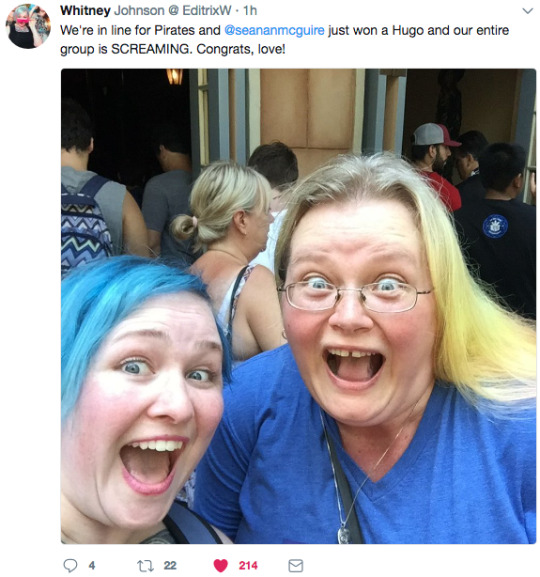
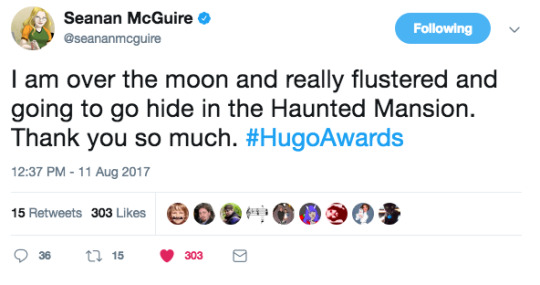
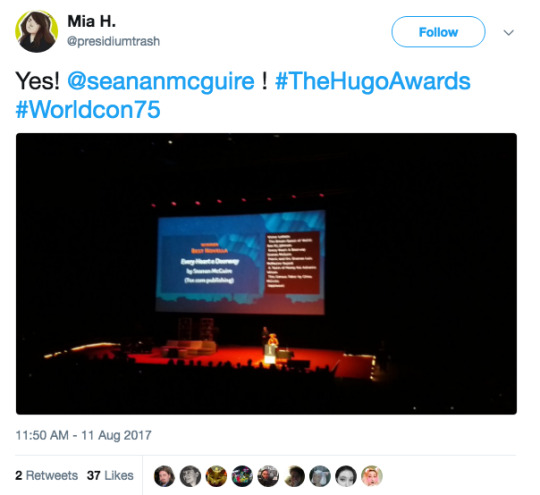
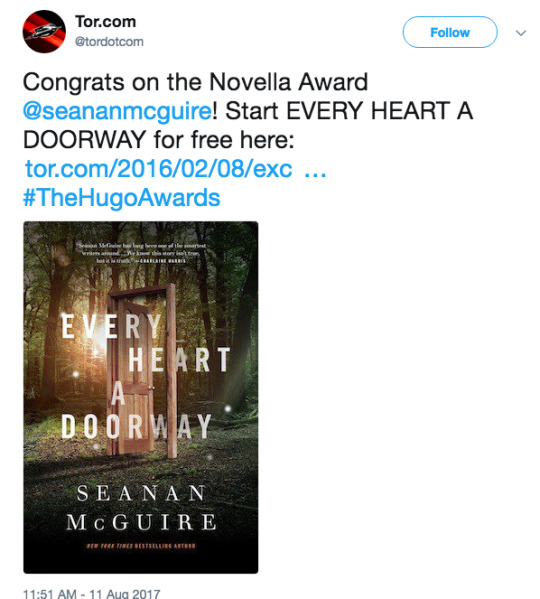
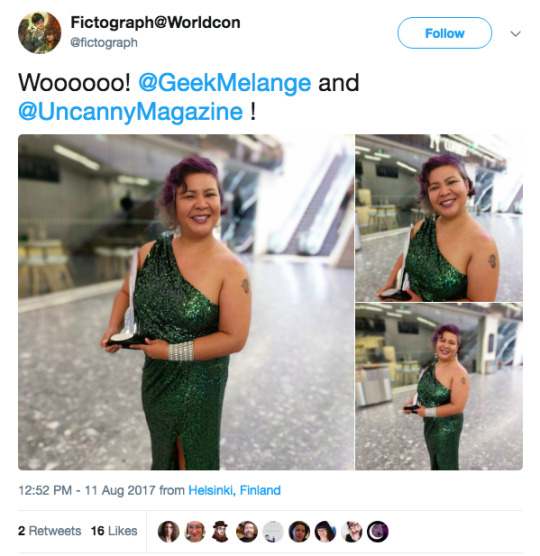
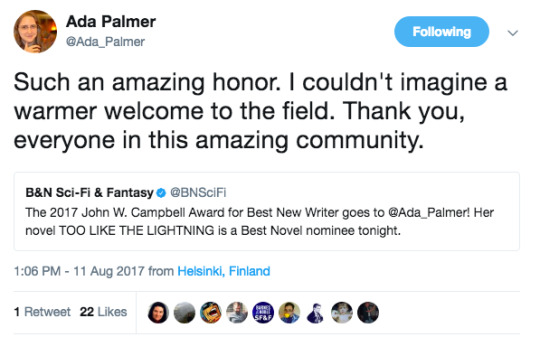
https://twitter.com/SFF180/status/896094928215842816
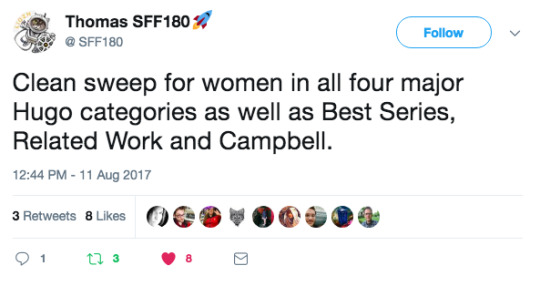
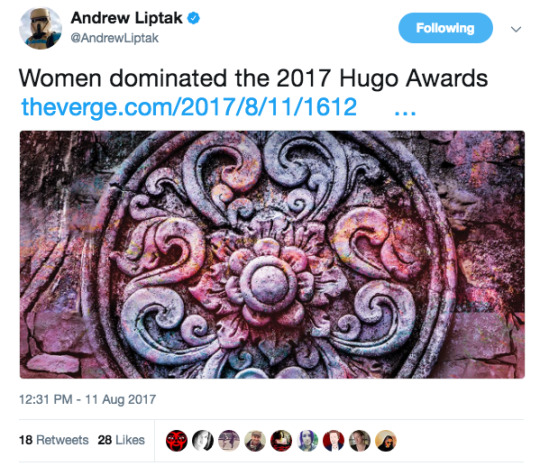
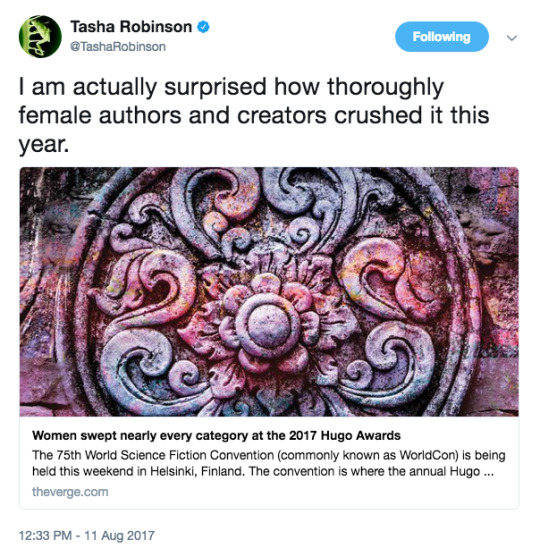
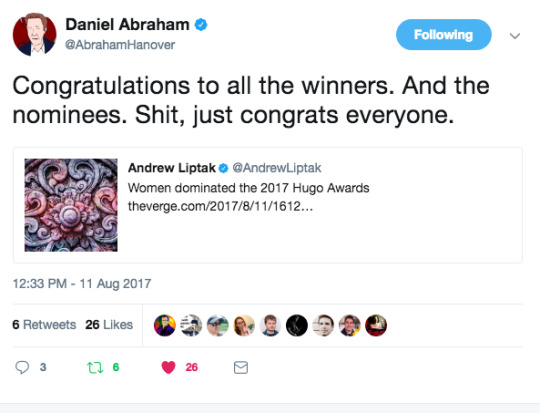
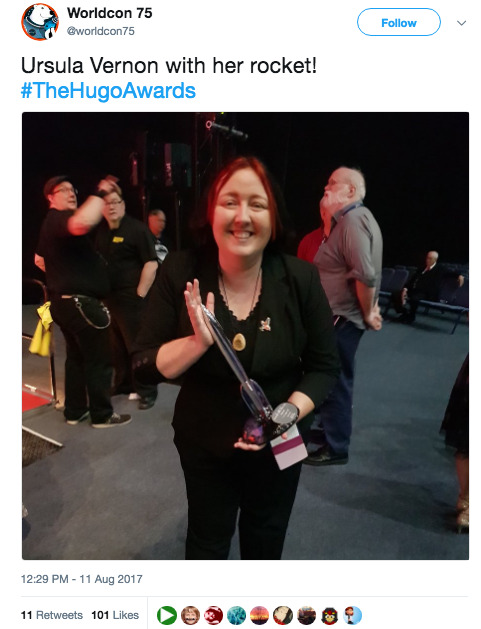
WHAT COULD I POSSIBLY TYPE HERE??
From The Verge: Women swept nearly every category at the 2017 Hugo Awards
by Andrew Liptak @AndrewLiptak Aug 11, 2017, 3:31pm EDT
Here’s the full list of nominees and winners (in bold) for 2017’s Hugo Awards:
BEST NOVEL
The Obelisk Gate by N. K. Jemisin
All the Birds in the Sky by Charlie Jane Anders
A Closed and Common Orbit by Becky Chambers
Death’s End by Cixin Liu
Ninefox Gambit by Yoon Ha Lee
Too Like the Lightning by Ada Palmer
BEST NOVELLA
Every Heart a Doorway by Seanan McGuire
The Ballad of Black Tom by Victor LaValle
The Dream-Quest of Vellitt Boe by Kij Johnson
Penric and the Shaman by Lois McMaster Bujold
A Taste of Honey by Kai Ashante Wilson
This Census-Taker by China Miéville
BEST NOVELETTE
The Tomato Thief by Ursula Vernon
Alien Stripper Boned From Behind By The T-Rex by Stix Hiscock
The Art of Space Travel by Nina Allan
The Jewel and Her Lapidary by Fran Wilde
Touring with the Alien by Carolyn Ives Gilman
You’ll Surely Drown Here If You Stay by Alyssa Wong
BEST SHORT STORY
Seasons of Glass and Iron by Amal El-Mohtar (The Starlit Wood: New Fairy Tales, Saga Press)
The City Born Great by N. K. Jemisin
A Fist of Permutations in Lightning and Wildflowers by Alyssa Wong
Our Talons Can Crush Galaxies by Brooke Bolander
That Game We Played During the War by Carrie Vaughn
An Unimaginable Light by John C. Wright
BEST RELATED WORK
Words Are My Matter: Writings About Life and Books, 2000-2016 by Ursula K. Le Guin (Small Beer)
The Geek Feminist Revolution by Kameron Hurley
The Princess Diarist by Carrie Fisher
Traveler of Worlds: Conversations with Robert Silverberg by Robert Silverberg and Alvaro Zinos-Amaro
The View From the Cheap Seats by Neil Gaiman
“The Women of Harry Potter” posts by Sarah Gailey
BEST GRAPHIC STORY
Monstress, Volume 1: Awakening, written by Marjorie Liu, illustrated by Sana Takeda
Black Panther, Volume 1: A Nation Under Our Feet, written by Ta-Nehisi Coates, illustrated by Brian Stelfreeze
Ms. Marvel, Volume 5: Super Famous, written by G. Willow Wilson, illustrated by Takeshi Miyazawa
Paper Girls, Volume 1, written by Brian K. Vaughan, illustrated by Cliff Chiang, colored by Matthew Wilson, lettered by Jared Fletcher
Saga, Volume 6, illustrated by Fiona Staples, written by Brian K. Vaughan, lettered by Fonografiks
The Vision, Volume 1: Little Worse Than A Man, written by Tom King, illustrated by Gabriel Hernandez Walta
BEST DRAMATIC PRESENTATION – LONGFORM
Arrival, screenplay by Eric Heisserer based on a short story by Ted Chiang, directed by Denis Villeneuve
Deadpool, screenplay by Rhett Reese & Paul Wernick, directed by Tim Miller
Ghostbusters, screenplay by Katie Dippold & Paul Feig, directed by Paul Feig
Hidden Figures, screenplay by Allison Schroeder and Theodore Melfi, directed by Theodore Melfi
Rogue One, screenplay by Chris Weitz and Tony Gilroy, directed by Gareth Edwards
Stranger Things, season 1, created by the Duffer Brothers
BEST DRAMATIC PRESENTATION – SHORTFORM
The Expanse: “Leviathan Wakes,” written by Mark Fergus and Hawk Ostby, directed by Terry McDonough
Black Mirror: “San Junipero,” written by Charlie Brooker, directed by Owen Harris
Doctor Who: “The Return of Doctor Mysterio,” written by Steven Moffat, directed by Ed Bazalgette
Game of Thrones: “Battle of the Bastards,” written by David Benioff and D. B. Weiss, directed by Miguel Sapochnik
Game of Thrones: “The Door,” written by David Benioff and D. B. Weiss, directed by Jack Bender
Splendor & Misery [album], by Clipping
BEST EDITOR – SHORTFORM
Ellen Datlow
John Joseph Adams
Neil Clarke
Jonathan Strahan
Lynne M. Thomas & Michael Damian Thomas
Sheila Williams
BEST EDITOR – LONGFORM
Liz Gorinsky
Vox Day
Sheila E. Gilbert
Devi Pillai
Miriam Weinberg
Navah Wolfe
BEST PROFESSIONAL ARTIST
Julie Dillon
Galen Dara
Chris McGrath
Victo Ngai
John Picacio
Sana Takeda
BEST SEMIPROZINE
Uncanny Magazine, edited by Lynne M. Thomas & Michael Damian Thomas, Michi Trota, Julia Rios, and podcast produced by Erika Ensign & Steven Schapansky
Beneath Ceaseless Skies, editor-in-chief and publisher Scott H. Andrews
Cirsova Heroic Fantasy and Science Fiction Magazine, edited by P. Alexander
GigaNotoSaurus, edited by Rashida J. Smith
Strange Horizons, edited by Niall Harrison, Catherine Krahe, Vajra Chandrasekera, Vanessa Rose Phin, Li Chua, Aishwarya Subramanian, Tim Moore, Anaea Lay, and the Strange Horizons staff
The Book Smugglers, edited by Ana Grilo and Thea James
BEST FANZINE
“Lady Business,” edited by Clare, Ira, Jodie, KJ, Renay, and Susan
“Castalia House Blog,” edited by Jeffro Johnson
“Journey Planet,” edited by James Bacon, Chris Garcia, Esther MacCallum-Stewart, Helena Nash, Errick Nunnally, Pádraig Ó Méalóid, Chuck Serface, and Erin Underwood
“nerds of a feather, flock together,” edited by The G, Vance Kotrla, and Joe Sherry
“Rocket Stack Rank,” edited by Greg Hullender and Eric Wong
“SF Bluestocking,” edited by Bridget McKinney
BEST FANCAST
Tea and Jeopardy, presented by Emma Newman with Peter Newman
The Coode Street Podcast, presented by Gary K. Wolfe and Jonathan Strahan
Ditch Diggers, presented by Mur Lafferty and Matt Wallace
Fangirl Happy Hour, presented by Ana Grilo and Renay Williams
Galactic Suburbia, presented by Alisa Krasnostein, Alexandra Pierce and Tansy Rayner Roberts, produced by Andrew Finch
The Rageaholic, presented by RazörFist
BEST FAN WRITER
Abigail Nussbaum
Mike Glyer
Jeffro Johnson
Natalie Luhrs
Foz Meadows
Chuck Tingle
BEST FAN ARTIST
Elizabeth Leggett
Ninni Aalto
Vesa Lehtimäki
Likhain (M. Sereno)
Spring Schoenhuth
Steve Stiles
BEST SERIES
The Vorkosigan Saga by Lois McMaster Bujold
The Craft Sequence by Max Gladstone
The Expanse by James S.A. Corey
The October Daye Books by Seanan McGuire
The Peter Grant / Rivers of London series by Ben Aaronovitch
The Temeraire series by Naomi Novik
JOHN W. CAMPBELL AWARD FOR BEST NEW WRITER
Ada Palmer
Sarah Gailey
J. Mulrooney
Malka Older
Laurie Penny
Kelly Robson
#Hugo Awards#Women in Scifi#Ada Palmer#n.k. jemisin#seanan mcguire#ursula vernon#ursula k. le guin#lois mcmaster bujold#vorkosigan#the expanse
1 note
·
View note
Text
2017 Hugo nominees: Best Short Story
As with the novelettes, many of these are available for free online, so I've provided links where I can.
"Our Talons Can Crush Galaxies," Brooke Bolander Another one I've read (more than once) because I'm an Uncanny subscriber, and the reason I've read it multiple times is because people seem to fall all over themselves loving this story and I ... do not, and keep hoping I'll see what others see in it. It's fine, I guess, but the writing feels overwrought to me. Clearly, mileage varies, so maybe you'll like it.
"Seasons of Glass and Iron," Amal El-Mohtar Yet another one I found via Uncanny, though it appeared there as a reprint; it's part of a collection of modern fairy tales, and it feels it, especially with references to seven-league boots and "shoes to dance to death in," along with all the other sorts of difficult shoes women have been made to wear in fairy tales. But this story isn't about shoes so much as how women cursed with fairy-tale fates might help each other, and become friends and more. The writing is beautiful and lyrical, and it's just a lovely story; go read it.
"The City Born Great," NK Jemisin If a story makes me exclaim out loud in glee at its writing, it's fair to say I liked it a lot, and in fact, "The City Born Great," which I'd never seen before today, is my #1 pick for this award. Some cities are large enough to take on a literal life of their own, but they have to be midwifed like any other child, and here the role falls to a homeless black youth abused by New York City's cops and white folk, but who's spent enough time roaming the city's streets to understand it like almost no one else.
"That Game We Played During the War," Carrie Vaughn An intriguing look at how two former prisoners of war, each on opposite sides, developed a friendship through chess – a difficult game to play when one of the players is a telepath. While the chess-as-war metaphor feels a little obvious, I still enjoyed this one a great deal.
"A Fist of Permutations in Lightning and Wildflowers," Alyssa Wong This is the third Wong piece I've read for this year's Hugos, and it may simply be time for me to classify her as a brilliant writer with a vivid, imaginative style who nevertheless just isn't quite my thing. The language and imagery here, as with the other work of hers I read, is stunning, but the nonlinear narrative, while completely understandable given that both main characters can see and explore multiple future possibilities, is confusing to follow. (I enjoy nonlinear narrative! This, though, just didn't work for me.)
"An Unimaginable Light," John C. Wright Ah, now we come to the Puppy entry, from noted homophobe and author John C. Wright. Having read excerpts of Wright's deathless prose before, I kept my expectations low, although now that I've read a complete story of his for myself, the highest praise I can muster here is "better than his buddy VD's entry a few years ago." This story is 17 pages of a "robopsychologist" mansplaining pseudo-philosophy to a young woman (naked, of course) whom he's ostensibly trying for crimes against ... oh, honestly, I didn't care, because this was simultaneously boring and hilariously unaware of its own kinks, and that's before you get to the obvious twist ending. It will give me great satisfaction to No Award this one, not because Wright is a terrible human being, but because he's a terrible writer.
The final ranking:
"The City Born Great"
"Seasons of Glass and Iron"
"That Game We Played During the War"
"A Fist of Permutations in Lightning and Wildflowers"
"Our Talons Can Crush Galaxies"
No Award
2 notes
·
View notes
Text
2017 Nebula Nomination Thoughts: Short Stories
2017 Nebula Nomination Thoughts: Short Stories
It’s that (late) time of year again, in which I read through the Nebula short fiction nominees! (I also plan on doing the Hugo’s this year, since this current ballot is not a trash fire.) In reverse order of what I did last year, I’m reviewing the short stories first. An important caveat concerning my response to two of these stories, both of which were hugely popular upon publication, is that I…
View On WordPress
#A Fist of Permutations in Lightning and Wildflowers#A. Merc Rustad#Alyssa Wong#Amal El-Mohtar#Barbara Krasnoff#Brooke Bolander#Caroline M. Yoachim#Nebula Awards#Our Talons Can Crush Galaxies#Sabbath Wine#Sam J. Miller#Seasons of Glass and Iron#short stories#This is Not a Wardrobe Door#Welcome to the Medical Clinic at the Interplanetary Relay Station│Hours since the Last Patient Death: 0”
0 notes
Photo
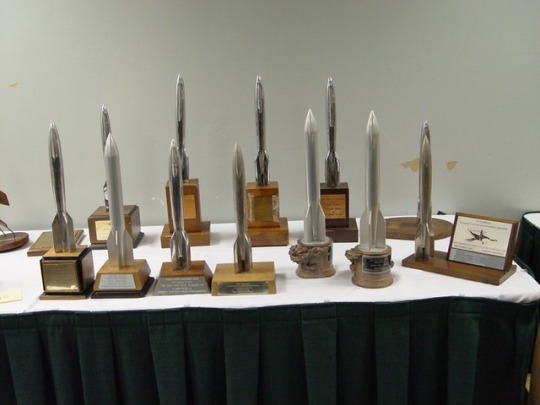
The Hugo finalists are out, and thanks to the wonders of modern technology you can check out many of them for free and from the comfort of this very web browser. Here are links to the novelette, short story, publications, and other Hugo finalists that are available online.
Best Novelette
The Art of Space Travel, by Nina Allan
The Tomato Thief, by Ursula Vernon
Touring With the Alien, by Carolyn Ives Gilman
You’ll Surely Drown Here If You Stay, by Alyssa Wong
Best Short Story
The City Born Great, by N.K. Jemisin
A Fist of Permutations in Lightning and Wildflowers, by Alyssa Wong
Our Talons Can Crush Galaxies, by Brooke Bolander
That Game We Played During the War, by Carrie Vaughn
Related Content
The Women of Harry Potter series, by Sarah Gailey
Best Semiprozine
Beneath Ceaseless Skies
GigaNotaSauraus
Strange Horizons
Uncanny Magazine
The Book Smugglers
Best Fanzine
Castalia House Blog
Journey Planet
Lady Business
Nerds of a feather, flock together
Rocket Stack Rank
SF Bluestocking
The Coode Street Podcast
#Hugo Awards#Ursula Vernon#Alyssa Wong#Carrie Vaughn#Carolyn Ives Gilman#Brooke Bolander#Sarah Gailey#awards
85 notes
·
View notes
Text
liveblogging the Hugo Voter’s Packet, part 5/?
Short stories: A Fist of Permutations in Lightning and Wildflowers by Alyssa Wong
Wait, no, I’ve read this one too
It’s very well-written!
I wouldn’t say the plot is hard to follow exactly. It’s a non-linear narrative featuring characters with reality-warping powers, so it’s more like it isn’t there to follow.
Once again social justice issues are a central concern--it’s about two reality-warping sisters and their reaction to the death (or probable, possible death) of one of them, who is trans, at the hands of bigots
But it’s not about the validity of trans identity or the evil of hatred-motivated murders. These things are assumed.
It’s more about grief, and anger, and the blurry line between selfishness and concern for loved ones and the possibility of living in a deeply unjust world
Anyway, good story.
Short stories: An Unimaginable Light by John C. Wright
I am not linking this one not because of my disapproval (although I do disapprove) but because, unlike all the other short stories on the ballot, it is not available online for free, or, if it is, I could not find it by googling or on the author’s website
Anyway, it’s the story of an inquisitor who is examining a young lady for thoughtcrime. The young lady is legally defined as a robot because ... she was artificially conceived? I’ll be honest, I wasn’t reading closely.
Here are some telling passages:
The kneeling girl did not look like a robot. She looked like a love goddess. Her face was piquant and elfin, her eyes danced and glittered. Her lips were full, her smile ready. She was pulchritudinous, buxom, callipygous, leggy. Her torso was slender, and her abdominal muscles as well defined as those of a belly dancer, so that her navel was like a period between two cursive brackets. Her hair was lustrous, and tied in a loose knot at the back of her swanlike neck. Hair, eye, and skin color were optional. She was, of course, naked.
He nodded. "And hurting human feelings is a type of harm. You are a robot and cannot be expected to understand the nature of pain. To utter certain types of truth is a micro-aggression. It creates a hostile environment we humans find uncomfortable."
There, now you know everything you need to know about John C. Wright
By the way, did I ever tell you how we went spelunking in Mt. Sodom for my kid’s birthday last year?
It’s got the largest salt caves in the world. It was really cool.
In conclusion: cannot recommend John C. Wright; do recommend Sodom.
ETA: Correction, I mean the largest natural salt caves, there are some really impressive ones elsewhere in slat mines but I haven’t been to those.
1 note
·
View note